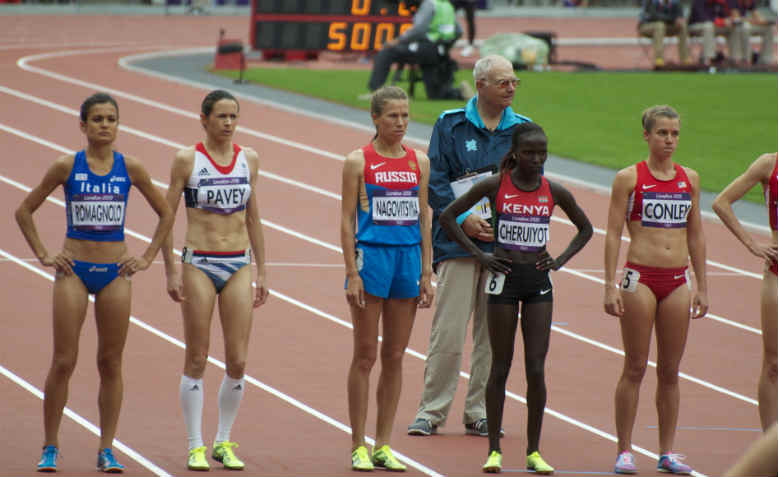 Five-time Olympian Jo Pavey (second left) at the 2012 Summer Olympics in London. Photo: Wikipedia/ Nick Webb
Five-time Olympian Jo Pavey (second left) at the 2012 Summer Olympics in London. Photo: Wikipedia/ Nick Webb
Mark Perryman outlines what Great Britain’s Olympic success does mean – and what it doesn’t mean
Team GB’s second place in the Rio medals table is nothing less than staggering. It is only 20 years ago that the squad returned with a solitary Gold from Atlanta ’96 clinging on to 36th in the table. This sporting nation is now ranked alongside the Olympian superpowers of USA and China. If it hadn’t been for the partial IOC ban on their competitors Russia would have been in the mix too but still this remains a remarkable Team GB medal haul.
Unlike the football World Cup the Olympics Medal Table is by and large an indicator of global economic and political power. These superpower nations, USA, China and Russia, cannot claim a single men’s Football World Cup title between them or have come anywhere but close, mostly. The Olympics is different. So how has Team GB ended up on top of the Olympic pile?
20 years ago apart from Atlanta ’96 there was also Euro ’96. England’s last semi-final appearance at a tournament, Scotland went out at the Group Stage and apart from France ’98 have failed to qualify since. Wales and Northern Ireland each had magnificent France 2016 campaigns this summer but apart from that the record has been pretty dismal. For England and a sport which, despite all the evidence, we still like to think we rule the world the contrast with Team GB’s recovery over those same two decades is startling.
The reasons are not so much to do with further, faster, higher than a victory of social-democracy vs neoliberalism. Yes that’s right. Via the Lottery all the most successful Team GB Olympic sports are state subsidised. A huge investment, £350 million over the Olympic Cycle, or around £5.5 million per medal won. But the values of social democracy that pervade this sporting success go further. The funding is subject to democratic rigours of collective regulation and accountability. The Olympic Sports entirely control the regime their athletes train and compete under with a relentless pursuit of Olympic success as the pinnacle of all achievement, if necessary at the cost of other competitions and honours.
The total opposite of this is of course English football. Here neoliberalism rules. Far more money is splashed about. £350 million? That wouldn’t be far off just one Premier League club’s transfer and wages budget for a single season. For what?
The ‘best league in the world’ (sic) is going backwards in terms of mounting a serious challenge to win the Champions’ League. And as the recent Euro 2016 Final proved the finest players in Europe, and this was also true of the World Cup 2014 Final too, the world as well, by and large play outside of England too. In classic neoliberal fashion the ‘richest league’ in the world has been wilfully mistranslated in to the ‘best league’ in the world.
But the biggest marker of this failure of course is the England football team. All the riches in the world and they cannot get past Iceland, or at World Cup 2014 out of their group. The sport’s governing body, the FA, has engineered the total deregulation of their own sport. Every club out for their own end. Private money chasing individual gain, no collective endeavour, zero accountability, hands-off governance The result is a catalogue of failure.
No Olympic sport would permit such an abdication of responsibility and thus the big result from Rio can’t simply be measured in the mountain of Gold, Silver and Bronze medals but Team GB’s social democratic values beating the freemarket failure of English football hands down.
However the social-democratisation of Team GB is flawed in one crucial respect. The £350 million bill has given those that enjoy their sport from the sofa a glorious two and a bit weeks. A quadrennial celebration of sport few will forget in a hurry. But while there will be a spike of interest in doing some of these sports without the infrastructure and funding to meet the largesse splashed out on the elite level this will be short-lived.
This isn’t to decry the Gold Medals. But we need a political conversation – this is about political choices – that makes the connection between a social democratic sports culture for some with one that is for all. To recognise that while TV viewing figures soar, the front page celebrations of Olympic success become a daily occurrence and the Gold Medal feelgood factor hits the heights none of this is enough to sustain a fundamental change in sport and leisure culture.
Team GB has helped prove what an impact public expenditure combined with regulation towards a collective end can achieve. And precious few complain.
But this race won’t truly be won until those resources are mobilised towards creating a sports and leisure culture that serves sport for all, and not just for some. If public expenditure is good enough to fund winning Gold Medals then isn’t it good enough to fund the return of school playing fields, build public swimming pools, construct jogging and exercise trails too.

